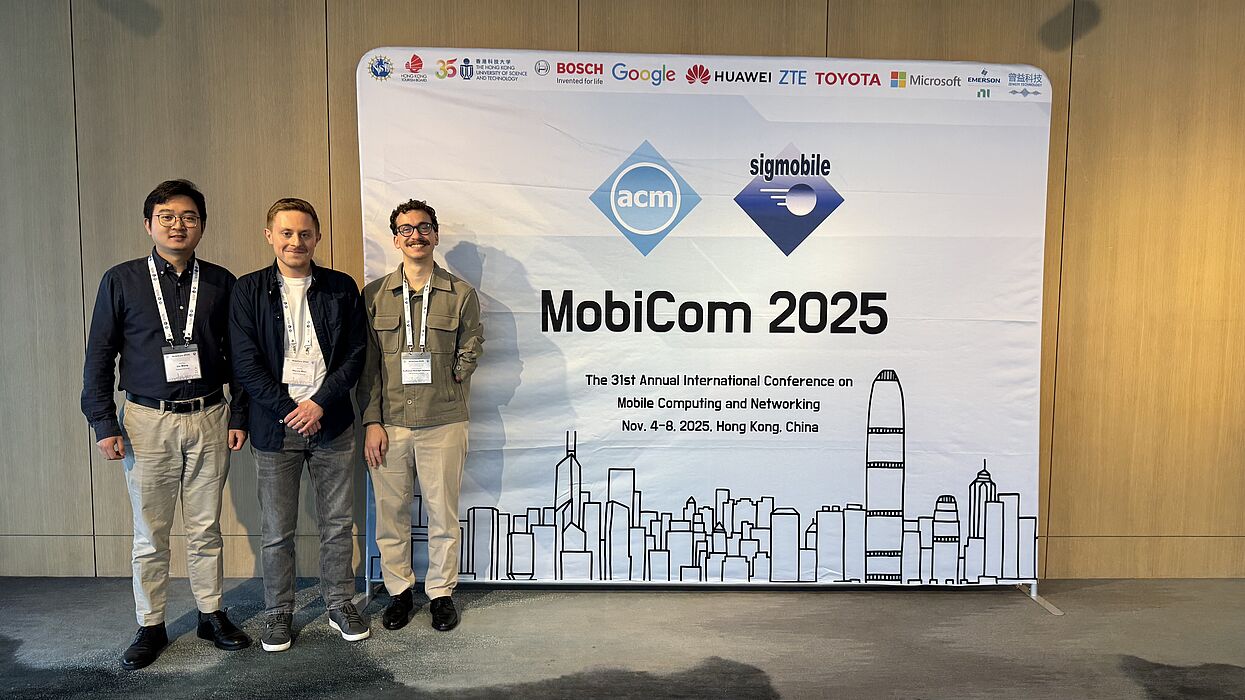During November 4-8, Marvin Illian, Guilherme Henrique Apostolo (VU Amsterdam), and Prof. Lin Wang attended ACM MobiCom 2025, a premier conference in the topic area of mobile computing and networking, held in Hong Kong, China.
Guilherme presented the following paper at the main conference.
Guilherme Henrique Apostolo, Pablo Bauszat, Vinod Nigade, Henri E. Bal, Lin Wang. Uirapuru: Timely Video Analytics for High-Resolution Steerable Cameras on Edge Devices. ACM MobiCom, 2025.
Abstract: Real-time video analytics on high-resolution cameras has become a popular technology for various intelligent services like traffic control and crowd monitoring. While extensive work has been done on improving analytics accuracy with timing guarantees, virtually all of them target static viewpoint cameras. In this paper, we present Uirapuru, a novel framework for real-time, edge-based video analytics on high-resolution steerable cameras. The actuation performed by those cameras brings significant dynamism to the scene, presenting a critical challenge to existing popular approaches such as frame tiling. To address this problem, Uirapuru incorporates a comprehensive understanding of camera actuation into the system design paired with fast adaptive tiling at a per-frame level. We evaluate Uirapuru on a high-resolution video dataset, augmented by pan-tilt-zoom (PTZ) movements typical for steerable cameras and on real-world videos collected from an actual PTZ camera. Our experimental results show that Uirapuru provides up to 1.45× improvement in accuracy while respecting specified latency budgets or reaches up to 4.53× inference speedup with on-par accuracy compared to state-of-the-art static camera approaches.
Marvin presented the following paper at the ACM MobiArch Workshop, co-located at MobiCom.
Marvin Illian, Björn Luchterhandt, Lin Wang. Band Switching for Mobile Energy Optimization in 5G Networks and Beyond. ACM MobiArch@MobiCom, 2025.
Abstract: The widespread deployment of 5G networks with 4G/LTE networks co-existing offers a rich set of heterogeneous frequency bands for mobile devices. Recent studies have explored intelligent band switching to improve network performance and application quality of experience (QoE). Yet, the cellular energy efficiency of mobile devices, a major factor contributing to user experience, has not been included in such designs. This paper fills this gap by proposing an energy-aware band switching mechanism. Specifically, we build system-level power models for cellular components on mobile devices based on measurements and show, through a case study, how the cellular energy efficiency of mobile devices affects band switching decisions. We further discuss challenges in making energy-aware band switching practical.

